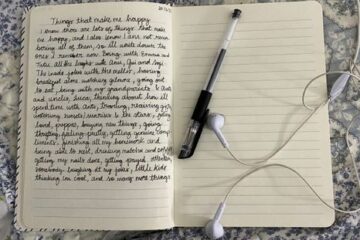There’s something undeniable about the bond between gay men and women pop stars. It’s a connection rooted in admiration, shared experiences, and a mutual understanding of resilience and self-expression. For me, this bond is deeply personal. It’s shaped by the women I’ve looked up to in my own life—my mom, my sister—and the pop icons who’ve given me the courage to embrace my identity.
Growing up in Joliet, Illinois, my childhood was filled with music, but it wasn’t just the radio hits or the country music that was frequently played in my family’s car that drew me in. It was watching my sister perform in musicals and being involved in choir in high school!
My sister’s passion for singing and being creative was contagious. She inspired me to try singing, to find my own voice, even when I felt uncertain or scared. In many ways, she was my first role model—a real-life example of how music and performance can be a way to connect with others and express who you are.
The Demi Era
When I first saw Demi Lovato belt out This Is Me, something clicked. I was obsessed—not just with the movie but with Demi’s raw emotion and unapologetic presence. As a kid, I didn’t have the language to describe what I felt, but I knew her performance spoke to something deep inside me. It wasn’t just about her being a great singer; it was about the way she conveyed vulnerability and strength at the same time.
For so many gay men, female pop stars like Demi Lovato become these larger-than-life figures who help us see parts of ourselves we might not yet understand. Their songs give us permission to feel deeply, to be dramatic, to celebrate parts of our identity that might not always feel accepted.
The Ariana Connection
As I grew older, my obsession with Demi expanded into a deep love for artists like Ariana Grande. Ariana represents everything I admire in a pop star: resilience, vulnerability, and an ability to connect with her audience on an emotional level. She’s the kind of artist who can take her pain—loss, heartbreak, struggle—and turn it into something beautiful and empowering.
Her music has been a constant in my life, especially during moments of self-discovery. Songs like No Tears Left to Cry and Into You are more than just bops; they’re anthems that remind me it’s okay to feel everything all at once and still keep going. Ariana’s ability to channel femininity, strength, and softness all at the same time resonates with me as a gay man. It feels like she sees and celebrates the parts of me that the world doesn’t always understand.
Women See Us
There’s something unique about the way women, particularly women in pop, see and celebrate gay men. It’s an unspoken connection, a sense of mutual understanding. Women often recognize and value our creativity, our resilience, and our ability to embrace parts of ourselves that others might dismiss or ridicule.
This connection isn’t just about the music; it’s about the shared experiences of navigating a world that often tries to diminish your voice. Women and gay men both understand what it’s like to be underestimated, to have to fight for your space, and to turn that struggle into art. Pop stars like Ariana, Demi, and others don’t just sing for us—they sing with us.
Empowerment Through Expression
For many of us, female pop stars represent a form of empowerment we didn’t know we needed. Their music gives us permission to be loud, emotional, and unapologetically ourselves. Watching them perform is like watching someone take the emotions you’ve been bottling up and turn them into something spectacular.
That empowerment isn’t limited to the stage. It trickles down into our everyday lives. For me, it’s in the confidence I feel when I’m singing, the way I approach relationships, and even how I dress or carry myself. Pop stars have taught me that self-expression is a form of power, and it’s something no one can take away from you.
A Bond That Lasts
As I reflect on my journey—from a kid idolizing Demi in Camp Rock to a 22-year-old finding strength in Ariana’s lyrics—I realize that my love for female pop stars is about more than just fandom. It’s about connection. It’s about the women who’ve shaped me, from my sister and her love of performing to the pop icons who’ve inspired me to embrace every part of who I am.
There’s a reason so many gay men feel this bond with women pop stars. It’s not just about their talent or their glamour. It’s about their ability to make us feel seen and understood. In a world that doesn’t always celebrate individuality, they remind us that being yourself is the most powerful thing you can do.
So here’s to the women—on stage and off—who’ve helped us find our voices, embrace our emotions, and feel a little less alone.

